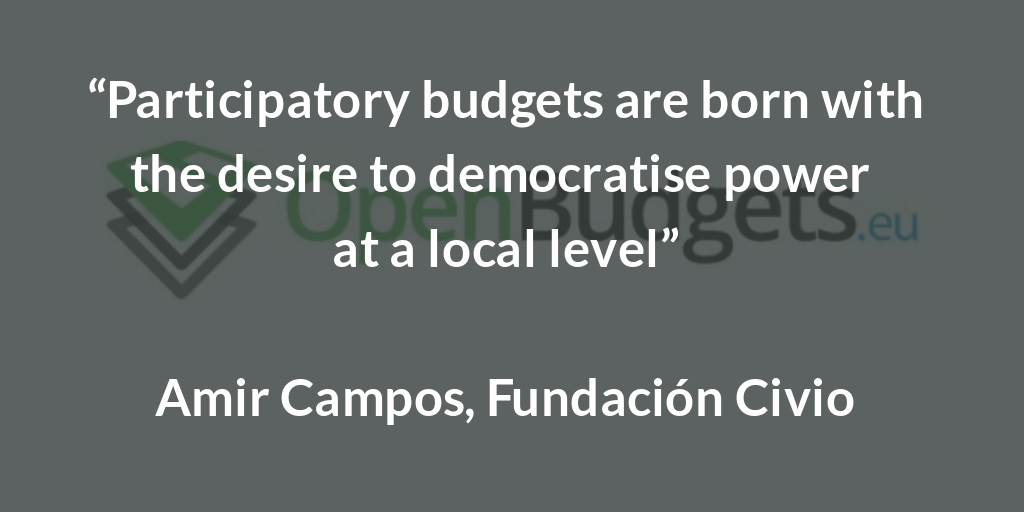For most municipalities, participatory budgeting is a relatively new approach to include their citizens directly in the decision making for new investments and developments in their community. Fundación Civio is a civic tech organisation based in Madrid, Spain that develops tools for citizens that both reveal the civic value of data and promote transparency. The organisation has developed an online platform for participatory budgeting processes, both for voting and monitoring incoming proposals, that is currently being tested in three Spanish municipalities.
Diana Krebs (Project Manager for Fiscal Projects at OKI) talked with Amir Campos, project officer at Fundación Civio, on how tech solutions can help to make participatory budgeting a sustainable process in communities and what is needed beyond from a non-tech point of view.

Participatory budgeting (PB) is a relatively new form for municipalities to engage with their citizens. You developed an online platform to help to make the participatory process easier. How can this help in order to turn PB in an integrative part of community life?
Participatory budgets are born with the desire to democratise power at a local level, to “municipalise the State”, with a clear objective, that these actions at local level serve as an example at a regional and national level and foster change in State participation and investment policies. This aim for the democratisation of power also represents a struggle for a better distribution of wealth, giving voice to the citizens, taking them out of political anonymity every year, making local investment’s needs visible much faster than any traditional electoral process. Participatory budgeting is a tough citizen’s marking of their local representatives.
The tool we have designed is powerful but easy to use because we have avoided the development of a tool that only technical people would use. Users are able to upload their own data (submitting or voting proposals, comments, feedback, etc. in order to generate discussions, voting processes, announcements, visualisations, etc.) It has a more visual approach that clearly differentiates our solution from existing solutions and gives further value to it. Our tool is targeted at administrators, users and policy makers without advanced technical skills and it is online, presented as Software as a Service (SaaS), avoiding the need for users to download or install any special software.
All in all, out tool, will bring the experience of taking part in a process of participatory budgeting closer to all citizens. Once registered, its user-friendliness and visual features will keep users connected, not only to vote proposals but also to monitor and share them, while exercising effective decision-making actions and redistributing available resources in their municipality. Along with off-line participatory processes, this platform gives voice to citizens, vote and also gives them the possibility of making their public representatives more accountable through its monitoring capabilities. The final aim is to enable real participatory experiences, providing solutions that are easy to implement by all stakeholders involved, thus strengthening the democratic process.
Do you think that participatory budgeting is a concept that will be more successful in small communities, where the daily business is less ruled by political parties’ interest and more by consent of what the community needs (like new playgrounds or sports parks)? Or can it work in bigger communities such as Madrid as well?
Of course! The smaller the community, the better the decision-making process, not only at the PB level but at all levels. Wherever there is a “feeling” of a community it is much easier to generate agreements oriented towards the common good. That is why in large cities there are always more than one PB process at the same time, one at the neighborhood level, and another at the municipal level (whole city), to engage people at the neighborhood level and push them to vote at the city level. Examples such as Paris or Madrid, which use on-line and off-line platforms use that division, instead, small town halls, such as Torrelodones, open just a single process for the whole municipality. All process need municipal representatives commitment and citizens engagement, connected to a culture of participation, for harvesting successful outcomes.
Do you see a chance that PB might increase fiscal data literacy if communities are more involved in deciding on what the community should spend tax money on?
Well, I am not sure about an improvement on fiscal data literacy, but I am absolutely convinced that citizens will better understand the budget cycle, concepts and the overall approval process. Currently, in most cases, budget preparation and approval has been a closed-door process within administrations. Municipal PB implementations will act as enabling processes for citizens to influence budget decisions, becoming actual stakeholders of the decision-making process and auditing budget compromised vs. actual spending and giving feedback to the administrations.
Furthermore, projects implemented thanks to a PB will last longer since citizens will take on a commitment to the project implemented, their representatives and their peers with whom individuals will have to agree once and will easily renew this agreement.
The educational resources available for citizens in the platform will help also to improve the degree of literacy. They provide online materials to better understand the budget period, terms used or how to influence and monitor the budget.
What non-tech measures and commitments do a municipal council or parliament need to take so that participatory budgeting will become a long-term integrative part of citizens’ engagement?
They will have to agree as a government. One of the key steps to maintain a Participatory Budgets initiative over time is to legislate on this so that, regardless of the party that governs the municipality, the Participatory Budgeting processes keep running and a long-lasting prevalence is achieved. Porto Alegre (Brazil) is a very good example of this; they have been redistributing their resources at the municipal level for the last 25 years.

Fundación Civio is part of the EU H2020 project openbudgets.eu, where it collaborates with 8 other partners around topics of fiscal transparency.
Diana is Project Manager for Fiscal Projects at Open Knowledge Foundation.









